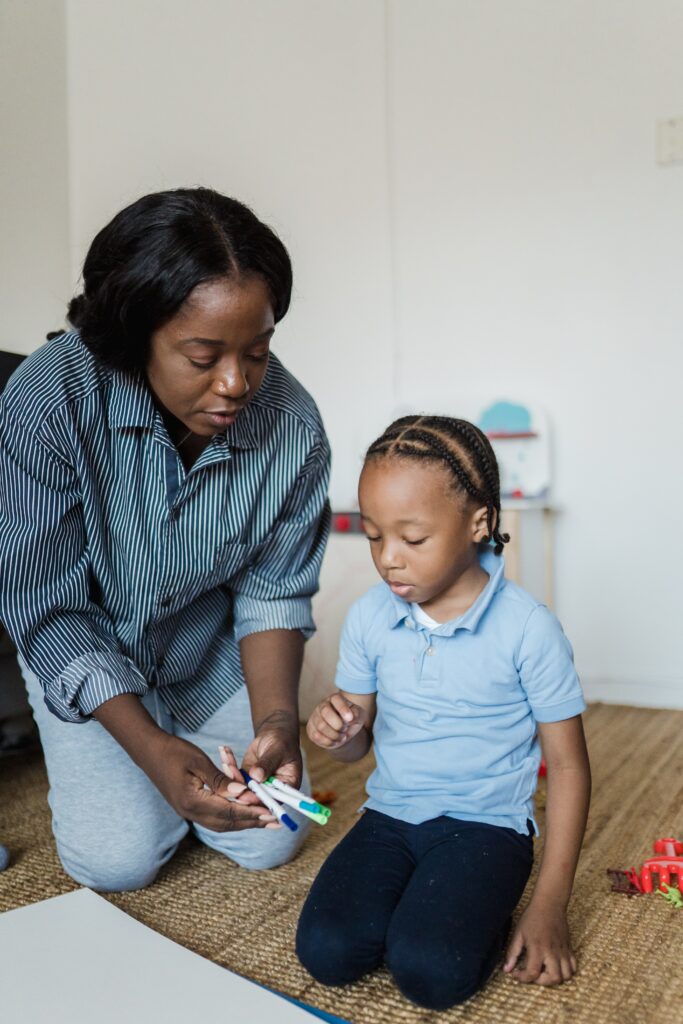Guest Blogger:
Leslie Fairchild & Vicki Still
GCPS ECSE Assessment Team Speech/Language Pathologists

Parents and caregivers have opportunities throughout the day to model and encourage language development.
Parents and caregivers have opportunities throughout the day to model and encourage language development. We believe that even the busiest parents can implement learning into everyday activities! These tips provide easy ways to be sure your child has the best opportunity to be successful communicators.
Tips to Encourage Language Development
- Acknowledge your child’s vocalizations (even if you are not sure they are “real words”); let them know that you hear them! “You’re right!” “I know!” “Ok!”
- Model for your child what you think they might be trying to say or something they could say, and maybe add a comment such as “Oh, you want a cookie! Here you go. Cookies are yummy!”
- Facilitate your child’s language development by describing what you are doing as you go through daily activities such as bath time, dressing and mealtime. Use simple sentences to talk to your child about everything you do when you are with her/him. (e.g. “Turn on the water”; “I’m going to put on your shirt. Shirt on!”; “Time to make dinner; let’s go to the kitchen”)
- Give your child choices (two acceptable items) and then give them time to make their selection. (e.g. “Should we put on your pants first or your shirt? Ok, yes, let’s put on your shirt!”)
- Take advantage of fun new experiences to expose your child to new vocabulary. Describe what you see and do in simple sentences, emphasizing less familiar vocabulary by using it in as many instances as you can naturally.
- Give your child time to tell you what they want or what they are thinking about, even if you already know.
- Teach language concepts, especially describing words like ‘big/little, heavy/light, top/bottom’ etc.. during play activities and as you go through your regular daily routine (ie. During bath time, put in a big boat and a little boat and talk about them).
- When asking your child a “who, what, where, when” question, provide them with a selection of appropriate responses to help them learn to give the type response needed. For example, if they are unable to answer “Who gave you the apple?”, you might say “Was it Mom or Taylor?”
- Listen to your child, acknowledge that you’ve understood their message, and then expand on their language by using well-formed sentences that are a little longer than theirs.
For example:
Child: “Truck broke.” Parent: “The truck is broken!! It needs a new windshield”
Child: “Her going to school.” Parent: “You’re right. SHE IS going to school.”
Child: “Where dog?” Parent: “Hmmm, where IS the dog? Where is he? Oh, I see him…”
Remember, the two important things are to let your child know you understand and value what he/she has said (accomplished by affirming the statement by repeating what he/she said or even rephrasing it), and then to let her/him hear the more mature model.
Don’t require that he/she repeat what you say every time or even most times, but only on occasion. Keep the communication process going and keep the feedback always positive.
Encourage improved speech skills by repeating words your child says incorrectly, modeling the correct production after they say a word. Make it natural and ‘conversational’ rather than sounding like you are correcting them. Don’t demand that they repeat it after you…The idea is that you are giving them the opportunity to hear a correct production and compare it to their own.
If you are unable to understand your child, help them avoid frustration by giving them suggestions for ways to explain what they are trying to say (taking you to the thing being discussed, using gestures, etc.) If you are still unable to understand them, explain that you really want to know what they are saying but you just can’t understand them this time.
Reduce screen time. Time on the computer and playing computer games does not encourage communication with others.
Join your child in their play, following their lead and talking about what you are doing. Pretend to go shopping, order pizza on the telephone, cook in the kitchen, feed the baby, build a house for play animals, play the vet, doctor…Provide the suggestions here and there but be sure your child is enjoying what you are doing.
Join the library and visit the children’s section often. Instill a love of books in your child!
Read to your child frequently, repeating favorite books often. Books with repeated, predictable phrases, like Brown Bear, Brown Bear are excellent, as are books that tell familiar stories with a sequence (such as about a child going to a birthday party, or to a grocery store). Encourage them to help tell the story as they become familiar with it by telling you what happens next, finishing a sentence you start or telling the story by the pictures. Repeating the same book over and over (if the child requests that) is appropriate and helps them learn.
Read and say rhymes, and sing simple repetitive songs to and with your child. Hearing and participating in the rhythm and rhyme facilitate language development.
In summary, always make these opportunities fun and low pressure, not requiring your child to imitate but responding positively when they join in. Do not expect perfection in your child’s speech and language skills. Avoid frequent corrections of their speech, especially when they are interested in telling you about things. Help them feel successful about their attempts to communicate. Keep it fun, simple, and repetitive. Kids learn through fun, active, meaningful activities that are repeated many times.
Remember, that these communication suggestions can be easily implemented during the activities of your daily routine. Your child will benefit greatly from your efforts to increase their ability to understand and use language throughout their day.


